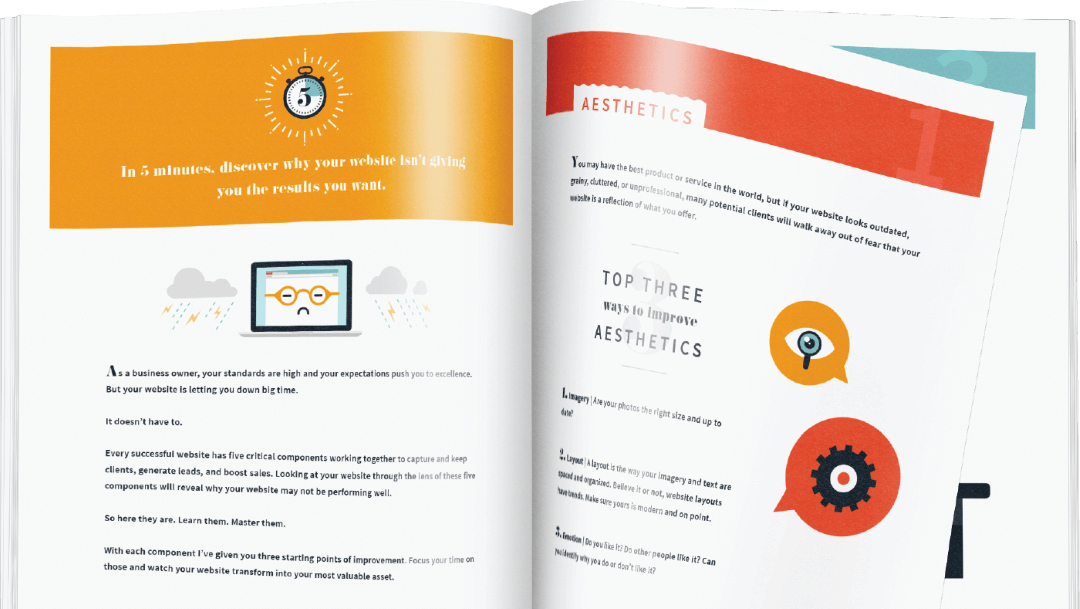For Christmas I decided to save a few dollars and bought my kids the knock-off version of crayons for their stocking stuffers. You know the ones I’m talking about. They promise all the excitement of a Crayola® box of crayons – endless coloring satisfaction – but once you open them, they’re a little waxier, a little less vibrant, and, as we discovered, much harder to color with. No beuno for my kids, who would much rather be wrestling anyway.
It got me thinking though. I meet so many businesses who look to save a buck and turn to one of the latest “drag and drop” DIY websites to be their online representation. I totally understand the appeal – those websites do look pretty. Plus they’ve got a hip vibe, they promise to be fast and easy, and everyone else is doing it, right?
And just like the cheap-o crayons, the appeal ends there. Once you get into it, you realize Crayola® actually does know what’s up, and you long to fork over those extra bucks you saved.
So, I’d like to spare you the heartache and give you four reasons why you should spring for the real deal and go custom from the beginning.
1. You’re unique. Your customer is unique.
The problem with DIY websites is that they provide one size fits all solutions for all their clients. So artists and accountants, doctors offices and donut shops, are all going to look alike. Or at least vaguely familiar. If you’ve ever experienced a deja vu while searching for a service online, you’ve probably run into another DIY site. Which happens to break the first rule of marketing – make your brand distinct, not the memory of someone or something else.
Not only does it become difficult to stay on-brand with a DIY site, if you have any industry-specific needs, you’re often out of luck. For example, if you are a restaurant who wants the allow your customer to reserve a table, a DIY site may have a plug-in that you can use, but it will look and behave exactly how they have it. If you don’t like how it flows, or if your colors are a lovely chocolate brown and ecru, and they only offer it in lime green and purple, nothing can be done about that.
2. You’re renting, not buying.
What you’re paying a DIY site for is the rental of their space and their tools. If in the end, you don’t like your site, you don’t actually own your content or the framework or functionality. You can’t take the information with you to a new provider and have a starting place, you have to start over from scratch. When you go custom from the beginning, all the files, content, framework, everything is yours to keep. That way, if you ever part ways with your web company, you can find another web company who can use the information you have as a starting point. Hundreds of dollars, sometimes thousands, in savings.
3. Holistic planning
While a DIY site gets you a website, it doesn’t take into account your traffic sources. Have you ever driven past a billboard where you were the only car for miles and you thought to yourself, “wow, someone wasted a lot of money on a poor marketing investment”? Building a website without considering how people are going to get there is a very similar poor investment. When you have a custom website, you can build in search engine optimization, social media integration, and, if your web company is good, they’ll help you flesh out the sort of content you need to fill your site with in order to speak to your ideal customer.
4. Proactive Service
DIY websites service hundreds and thousands of websites. How do you think you fit into that picture? Do you suppose the owner is waiting by his cell phone ready to help you with your latest technical frustration? My guess is likely not. With a small web firm, you have a dedicated team of capable people ready to help you. I know for our firm, we’ve built our whole business model around proactive service. Which means, we’re looking for the problems before they even happen. We’re in the technology every day. We know what sort of changes are on the horizon and we know what already has been outmoded. We make it our priority to make our clients thrive online instead of flounder. Even the best DIY site just doesn’t have the capacity to offer that level of help.
To bring it back to crayons, a custom website might be more than you were hoping to spend, but, in the end, your website will look exactly like your business, do what your business needs it to do, and work as smooth and vibrantly as that new box of Crayolas.
If your website isn’t doing that for you right now, take a look at our Website Assessment Guide. It’s a great place to get started. Discover the five critical components that make up a successful website, and evaluate yours today. We’ll be here if you need any help!

